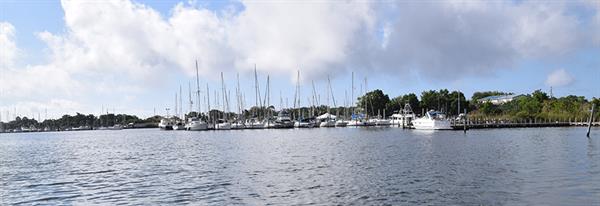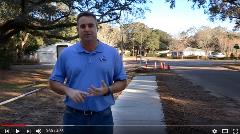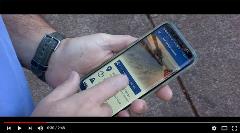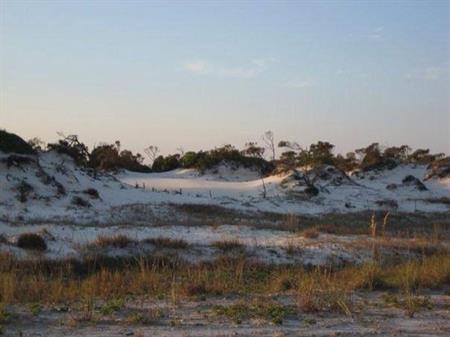|

THE UNDERHILL UPDATE
with District 2 Commissioner Doug Underhill
February 2018 Newsletter
MyEscambia.com/District2

Bayou Chico Restoration Efforts Move Forward
Identifying and removing more than 100 years of lingering pollution in Bayou Chico will not be an easy task, but Escambia County is taking the first steps toward restoration thanks to $335,000 in RESTORE Act funding.
So how did the bayou get to be contaminated? There’s no simple answer, but in the early 1900s, little was known about how pollutants could impact waterways. Chemicals and other waste were commonly disposed of in the nearest body of water, which happened to be Bayou Chico for many surrounding industries.
Rather than decomposing or diluting as once thought, the contaminants have remained in the bayou’s sediment and have been stirred up over the years. One of the first steps toward restoring Bayou Chico is identifying the extent of the contaminants so they can eventually be removed.
The Escambia County Natural Resources Management Department recently took this first step by completing a study of the fine-grain sediment located throughout the bayou, which included mapping the current distribution of sediments and estimating total volume. By utilizing county staff and resources to conduct the study, the county will realize a significant cost savings and conserve planning funds.
The Gulf Coast Ecosystem Restoration Council recently awarded $335,000 in RESTORE Act funding to Escambia County through the State of Florida to develop this plan to address the contaminated sediments. Along with working to improve the water quality and overall ecosystem of Bayou Chico, the project seeks to enhance economic and recreational opportunities along the waterfront.
Natural Resources staff are using data generated by the sediment study to develop a plan to evaluate the extent of contamination within the fine-grain sediments. Field work for this next step is expected to begin later this year.
While it’s important to note that the sediment removal won’t be a magic fix for Bayou Chico – and it won’t happen overnight – it is a major step toward the goal of restoring the bayou’s water quality.
To learn more and to download a summary report from the county’s sediment study, visit www.myescambia.com/RestoringBayouChico.
Watch our Latest Videos
 |
Sidewalks and streetlights are two of the most requested items in District 2. Join Commissioner Underhill as he discusses recent projects and how to have your request heard. Click here to watch. |
 |
Commissioner Doug Underhill shows just how easy it is to connect with non-emergency services delivered by the departments housed under the Escambia County Commission using the Ask MyEscambia mobile and desktop application. Click here to watch. |
|
Dune Restoration Project set for March
After almost six years, dune restoration on the Key will finally start from March 5-April 14. The proposed project will restore dune vegetation to approximately 20 acres of degraded beach dune habitat in Perdido Key. With this project, DEP and Escambia County are not only enabling the property owners to repair the harm done in the aftermath of the Deepwater Horizon tragedy, but improving the resiliency of the island to natural disasters. Persistent efforts to implement 'intelligent stewardship' projects like this can delay the need for artificial beach nourishment, potentially permanently.
The dune restoration project will consist of planting appropriate dune vegetation such as sea oats, cord grasses, beach elder, panic grasses and sea purslane. Planting will occur immediately seaward of the existing vegetation, at approximately 20-60 feet seaward of the existing primary dune to provide a buffer and enhance dune habitats. The construction is expected to take 60-90 days. Similar to the dune planting that occurred in 2006, the restoration won’t cause privately owned beaches to become public, and it will be conducted in a way that minimizes potential disturbance to birds, sea turtles and other wildlife in the area.
The Florida Department of Environmental Protection awarded $611,234 in NRDA grant funding for the project as part of an early restoration settlement to offset injury to natural resources from the Deepwater Horizon explosion and oil spill.

Not Just Tourists Enjoying the Keys
With March quickly approaching, so is sea turtle nesting season. Escambia County beaches are home to four of the six species of sea turtles found in U.S. waters. Did you know only an estimated one in 1,000 sea turtle hatchlings survive to reach adulthood. Removing beach furniture at night, placing beach furniture at least five feet away from marked nests and keeping trash out of the water can increase the odds of sea turtles reaching adulthood. Last year, Perdido Key more than doubled the number of nests in 2016, rising from 14 to 33 nests. With 111 locations targeted for lighting improvements, we are looking to see the numbers of nests rise even more. The loggerhead sea turtle, the green sea turtle, the leatherback sea turtle and the Kemp's Ridley nest annually on Escambia County's beaches from March through September. All species of sea turtles are listed as threatened or endangered and are protected by the Endangered Species Act.

Upcoming Meetings & Events
Development Review Committee
Escambia Central Office Complex
3363 West Park Place
Wednesday, Feb. 7
1 p.m.
UF/IFAS Extension - Growing Potatoes in Containers
Myrtle Grove United Methodist
1030 N. 57th Ave.
Wednesday, Feb. 7
6 p.m.
Science Hour - Project Oyster Pensacola
Escambia Central Office Complex
3363 West Park Place
Thursday, Feb. 8
6 p.m.
Mass Transit Dependent Special District Town Hall
Ernie Lee Magaha Government Building
221 Palafox Place
Monday, Feb. 12
5:30 p.m.
CRA, BCC Agenda Review, Public Forum & Regular Meeting
Ernie Lee Magaha Government Building
221 Palafox Place
Thursday, Feb. 15
9 a.m., 9:15 a.m., 4:30 p.m. & 5:30 p.m.
Offices Closed in Observance of Presidents Day
Monday, Feb. 19
UF/IFAS Extension - Growing Tomatoes in Pots
Myrtle Grove United Methodist
1030 N. 57th Ave.
Wednesday, Feb. 21
6 p.m.
Black History Month Program
Brownsville Community Center
3200 W. DeSoto St.
Thursday, Feb. 22
6 p.m.
Development Review Committee
Escambia Central Office Complex
3363 West Park Place
Wednesday, Feb. 28
1 p.m.
UF/IFAS Extension - Attractive Edibles
Myrtle Grove United Methodist
1030 N. 57th Ave.
Wednesday, Feb. 28
6 p.m.
|



